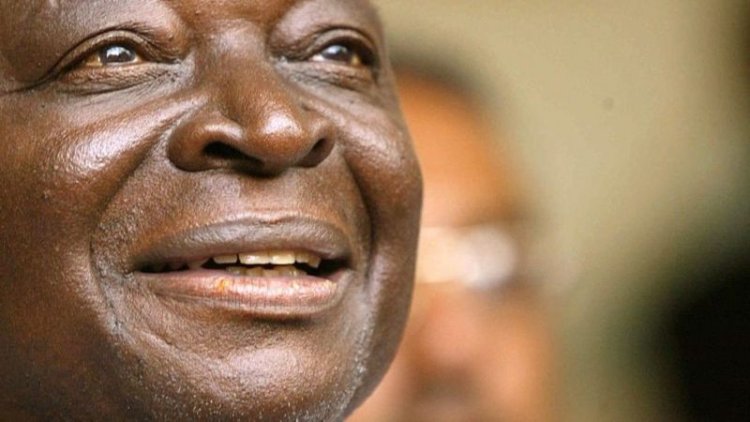Mwai Kibaki, Kenya's ex-President: Hope and Disappointment
Kibaki had a reputation for being a fence sitter, but some attributed his presidency's weakness to his ill-health, which made him readily led by people around him.

Mwai Kibaki, Kenya's third president, who died at the age of 90, will be remembered for breaking the former ruling party's stranglehold, but his legacy will be eclipsed by the violence that erupted after the 2007 election, which resulted in the deaths of over 1,200 people.
When Kibaki first came to power in 2002 as the leader of a broad coalition of opposition parties, he ushered in a revolution.
His presidency marked the end of the Kenya African National Union's (Kanu) nearly four decades of dominance, of which he was a member for nearly 30 years.

Thousands attended the inauguration of President Mwai Kibaki in 2002
Kibaki liberalized the economy during his first term in office, resulting in significant economic growth.
A new sense of pride and belonging consumed the nation and industrious Kenyans launched businesses across the country as improved infrastructure opened up new markets.
Kibaki also introduced free primary school education, transforming the lives of an estimated one million children who would not have otherwise gone to school.
His landslide victory over Kanu contender and current Kenyan President Uhuru Kenyatta signaled a new beginning for the country.
During Kanu's tenure, opponents were intimidated, institutions designed to keep the government in check were hollowed out, and there was rampant corruption.
At his inauguration in 2002, Kibaki told the cheering audience, "I believe that government exists to serve the people, not the people who serve the government."
Fast forward five years and his rushed swearing-in following a contested election as riots erupted across the country symbolized the waning of that initial optimism.
In his first term, Kibaki as the head of a multi-ethnic coalition had the chance to heal the country's divisions, but the violence that followed the December 2007 election exposed the continued rifts.
An estimated 1,200 people were killed and around 600,000 fled their homes as people were targeted for their ethnicity.
Kibaki's allies were accused of rigging the vote which, according to the official tally, saw him narrowly triumph over Raila Odinga. An independent investigation later found that both sides had participated in electoral malpractices and said it was impossible to determine who had won.

The violence after the disputed 2007 poll led to the deaths of at least 1,200 people
Announcing his predecessor's death, President Kenyatta described Kibaki "as a gentleman in Kenya's politics. A brilliant debater whose eloquence, wit, and charm won the day time and time again."
But he was also known for his indecisive nature which prevented him from making the bold decisions that would have served the country better.
His first term called for a steely determination to defeat the divisive forces around him, as well as bring an end to corruption in the country. Instead, he appeared to go along with them.
Kibaki also dashed the hopes of those who thought he would introduce a new constitution that would loosen the grip of the presidency on the country.
Instead, he proposed one which appeared to do the opposite and was rejected in a referendum in 2005.
There was also a sense of a missed opportunity in the fight against corruption, as many Kenyans were willing to back the crusade Kibaki had promised.
Citizens arrested traffic cops who had asked for bribes amid the government's well-publicized anti-corruption effort, according to one of the most well-known stories of the time. It had a lot of words but not a lot of action.
Kibaki had a reputation for being a fence sitter, but some attributed his presidency's weakness to his ill-health, which made him readily led by people around him.
He had been in a vehicle accident during the 2002 election campaign, and when he was sworn in, he was in a wheelchair with his leg still in plaster. He is thought to have had a stroke shortly after and was debilitated when he left the hospital.
The turbulence and resentment that erupted in the aftermath of the 2007 elections were only put to a stop by former UN Secretary-General Kofi Annan, who arranged a power-sharing agreement.
Kibaki was re-elected president, while Odinga was named prime minister.
Following the riots, a new constitution was ratified that devolved power.

Mwai Kibaki (R) appeared in a wheelchair at his 2002 inauguration alongside his predecessor Daniel Arap Moi (L)
After serving for more than five decades in public service, Kibaki stood down in 2013 after reaching the constitutional maximum of two terms.
He was born in a community in Kenya's Central Province in 1931 when the country was still under British authority.
He moved on to Makerere University in Uganda to study economics before winning a Commonwealth scholarship to study public finance at the London School of Economics.
He was teaching economics at Makerere University in the late 1950s when he chose to get active in Kenyan politics and became an MP in 1963.
He served in Kanu administrations as a finance minister under Kenya's first president, Jomo Kenyatta, and subsequently as a vice-president, deputizing for Daniel Arap Moi.
But, after the introduction of a multi-party system in 1991, which he initially opposed, Kibaki crossed the ship and became an opposition leader, unsuccessfully competing for president twice.
He was notorious for using an organized shadow cabinet to keep the government in check, including presenting an alternative budget.
His victory in 2002 ushered in one of Kenya's brightest moments, but he squandered the opportunities due to his lack of boldness and, at times, tact.

 Boakyewaa Lawrencia
Boakyewaa Lawrencia 



































